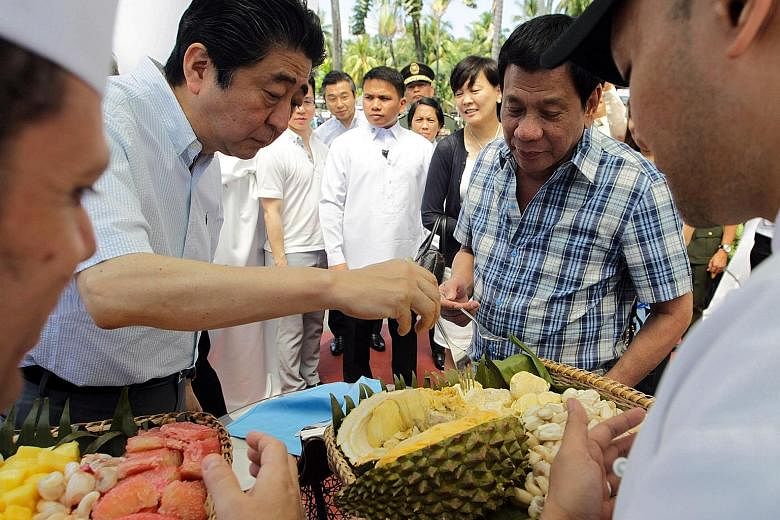Japan's Prime Minister Shinzo Abe sat for breakfast yesterday at President Rodrigo Duterte's modest family home in Davao city, in a day of folksy diplomacy that also saw the guest name one of the world's rarest birds and enjoy durian.
"This was what (Mr Duterte) wanted - friendly, not too formal, without much protocols - so they would feel that they are more than friends, that they are brothers," the Philippines' Assistant Communications Secretary Ana Maria Banaag told reporters.
Mr Abe, 62, dropped by the two-storey house that Mr Duterte shares with his common-law wife, Ms Cielito "Honeylet" Avancena, 46, a former nurse, and their 12-year-old daughter, Kitty, at around 9am.
Japan's normally dark-suited leader came dressed-down in a white short-sleeved polo shirt tucked inside grey pants.
Mr Duterte received him in an untucked flannel shirt, dark pants and leather shoes, but without socks - a familiar look for the 71-year-old politician who ruled Davao, 1,000km from Manila, for over two decades.
Mr Duterte gave his guest a tour of his home, where they spent about 10 minutes inside Mr Duterte's bedroom.
Photos posted online showed the two posing, with Mr Duterte's aide Christopher Go, beside a bed festooned with Mr Duterte's "old and favourite mosquito net".
Mr Duterte spends half his week in Manila and the other half in Davao, as he finds it difficult to sleep anywhere else other than inside his own bedroom, beneath his mosquito net.
Mr Abe and Mr Duterte then had breakfast around a small table. They had sweet rice cakes and mung bean soup.
They then proceeded to a hotel overlooking the sea for a meet- and-greet with Filipino and Japanese businessmen.
Later, Mr Abe officially named a two-year-old Philippine eagle "Sakura", after the famed Japanese cherry blossom. There are only about 600 of these raptors left in the wild.
Mr Abe then had a tasting of durian, a key export of Davao.
He ended his Davao trip at a Japanese-language school, where he was greeted by hundreds of singing and flag-waving children, and posed gamely for wefies.
Mr Abe's personal touch shows his determination to maintain ties with the Philippines as Japan competes with China for influence and business deals.
"Abe is using an exquisite combination of subtle and personal diplomacy, pro-actively reaching out to Duterte who has maintained very close ties with Japan while recalibrating relations with America and China," political analyst Richard Javad Heydarian told Bloomberg.
Mr Abe arrived in Manila on Thursday, kicking off a six-day tour of Asia-Pacific nations.
He has sought to woo the Philippines with a US$9 billion (S$12.8 billion) aid package, and has also offered to help Mr Duterte with his war on drugs and terrorism.

